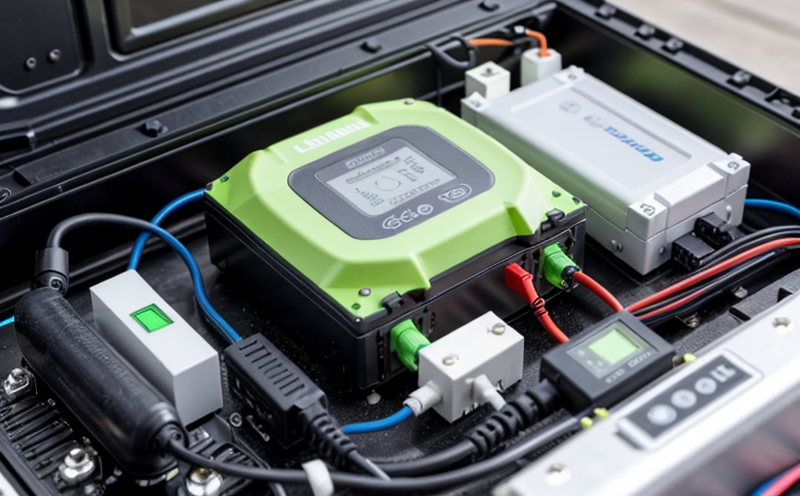UL 2580 Lithium-Ion Battery Safety and Performance Testing for EV Systems
The UL 2580 standard is a pivotal benchmark in the automotive industry, specifically addressing lithium-ion batteries used in electric vehicle (EV) systems. This stringent set of requirements aims to ensure that these batteries are safe and reliable under various conditions. Compliance with UL 2580 is crucial for manufacturers looking to secure certification from major markets globally.
The standard covers a range of tests, including thermal abuse, mechanical abuse, electrical abuse, and fire resistance. These tests simulate real-world scenarios where the battery might be subjected to extreme conditions, ensuring it remains safe and functional. The testing process involves rigorous evaluation to ensure that the battery can withstand such stresses without compromising safety or performance.
The UL 2580 standard is particularly important for EV manufacturers as it helps in mitigating risks associated with lithium-ion batteries, which are known for their potential for thermal runaway if not properly designed and manufactured. The tests included under this standard provide a comprehensive assessment of the battery's integrity and safety features.
The testing process begins with the preparation of the specimen, ensuring it meets the required specifications as outlined in UL 2580. Once prepared, the battery undergoes various abuse conditions, including high-temperature exposure, low-temperature exposure, drop tests, overcharge/overdischarge scenarios, and more.
After undergoing these rigorous tests, the results are meticulously analyzed to determine compliance with the standard's criteria. Compliance indicates that the battery meets safety standards for use in electric vehicles. This certification is vital for manufacturers as it not only ensures safety but also enhances consumer confidence in EV systems.
The UL 2580 standard sets a high bar for lithium-ion batteries used in EVs, ensuring they are safe and reliable under various conditions. Compliance with this standard is essential for manufacturers to secure certifications from major markets globally. The rigorous testing process helps mitigate risks associated with lithium-ion batteries, providing peace of mind for both manufacturers and consumers.
For R&D engineers, the UL 2580 standard offers a clear roadmap for developing safe and efficient battery systems. Quality managers can use it as a benchmark to ensure their products meet stringent safety requirements. Compliance officers will find this standard invaluable in ensuring that all aspects of the manufacturing process adhere to international standards.
The testing process is complex, involving not only the physical abuse tests but also comprehensive analysis of electrical and thermal parameters. This ensures that every aspect of the battery's performance is thoroughly evaluated. The UL 2580 standard thus plays a crucial role in maintaining safety and reliability across the industry.
Benefits
Ensures compliance with international standards, enhancing market access.
Reduces risks associated with lithium-ion batteries through rigorous testing.
Improves consumer confidence in EV systems by ensuring safety and reliability.
Simplifies the certification process for manufacturers aiming to enter major markets.
The UL 2580 standard is a critical tool for manufacturers, offering peace of mind that their products meet stringent safety requirements. By adhering to this standard, manufacturers can ensure they are meeting global regulatory requirements and enhancing consumer trust in EV systems.
Environmental and Sustainability Contributions
The UL 2580 standard not only ensures the safety of lithium-ion batteries but also contributes positively to environmental sustainability. By reducing the risk of accidents involving these batteries, it helps minimize waste and potential environmental hazards. This is particularly important given the growing concern over e-waste.
Compliance with this standard aids in the development of more efficient and sustainable EV systems. It encourages manufacturers to innovate and improve battery designs that are not only safe but also environmentally friendly. The UL 2580 testing process helps identify potential areas for improvement, promoting a culture of sustainability within the industry.
The rigorous testing ensures that batteries perform consistently across different environmental conditions, which is crucial for reducing resource consumption in manufacturing processes. By ensuring that batteries are robust and reliable, manufacturers can minimize waste and improve overall efficiency, contributing to a more sustainable future.
Use Cases and Application Examples
| Test Scenario | Description | Expected Outcome |
|---|---|---|
| Thermal Abuse Test | The battery is subjected to high-temperature conditions, simulating extreme heat during operation. | The battery should not ignite or release toxic gases under these conditions. |
| Mechanical Abuse Test | The battery undergoes drop tests from a specified height to assess its structural integrity. | The battery should withstand the mechanical stress without compromising safety or performance. |
| Electrical Abuse Test | The battery is subjected to overcharge and overdischarge conditions to evaluate its electrical stability. | The battery should maintain its functionality and not exhibit any signs of failure. |
| Fire Resistance Test | The battery is exposed to fire, simulating a worst-case scenario during an accident. | The battery must remain safe and stable under these conditions without igniting or releasing harmful substances. |
Ensures compliance with UL 2580 is essential for manufacturers entering global markets.
Provides a roadmap for R&D engineers to develop safe and efficient battery systems.
Simplifies the certification process for quality managers, enhancing market access.
The UL 2580 standard is widely recognized across the industry as a benchmark for safety in lithium-ion batteries used in EVs. Compliance with this standard ensures that manufacturers meet stringent international standards, which is crucial for global market entry and consumer trust.





